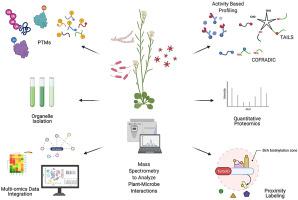Current Opinion in Plant Biology ( IF 8.3 ) Pub Date : 2021-06-05 , DOI: 10.1016/j.pbi.2021.102061 James M Elmore 1 , Brianna D Griffin 1 , Justin W Walley 1

|
Pathogen infection triggers complex signaling networks in plant cells that ultimately result in either susceptibility or resistance. We have made substantial progress in dissecting many of these signaling events, and it is becoming clear that changes in proteome composition and protein activity are major drivers of plant-microbe interactions. Here, we highlight different approaches to analyze the functional proteomes of hosts and pathogens and discuss how they have been used to further our understanding of plant disease. Global proteome profiling can quantify the dynamics of proteins, posttranslational modifications, and biological pathways that contribute to immune-related outcomes. In addition, emerging techniques such as enzyme activity–based profiling, proximity labeling, and kinase-substrate profiling are being used to dissect biochemical events that operate during infection. Finally, we discuss how these functional approaches can be integrated with other profiling data to gain a mechanistic, systems-level view of plant and pathogen signaling.
中文翻译:

功能蛋白质组学研究植物-病原体相互作用的进展
病原体感染会触发植物细胞中复杂的信号网络,最终导致易感性或抗性。我们在剖析许多这些信号事件方面取得了实质性进展,并且很明显蛋白质组组成和蛋白质活性的变化是植物-微生物相互作用的主要驱动因素。在这里,我们重点介绍了分析宿主和病原体功能蛋白质组的不同方法,并讨论了它们如何被用于进一步了解植物疾病。全局蛋白质组分析可以量化蛋白质的动力学、翻译后修饰和导致免疫相关结果的生物途径。此外,新兴技术,如基于酶活性的分析、邻近标记、和激酶底物分析正被用于剖析感染过程中发生的生化事件。最后,我们讨论如何将这些功能方法与其他分析数据相结合,以获得植物和病原体信号传导的机械、系统级视图。











































 京公网安备 11010802027423号
京公网安备 11010802027423号